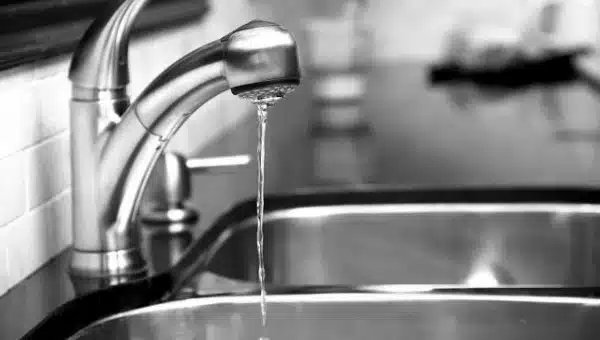As a new homeowner, you’re likely discovering a whole new world of responsibility. From landscaping to plumbing, it seems like there’s always something that requires your attention. One particular problem that can be a real headache is dealing with low water pressure. Whether you’re trying to enjoy a hot shower or just washing dishes, low water pressure can be a true nuisance. But don’t worry – we’ve got you covered. Here are the ABCs of low water pressure – common causes explained.
Table of Contents
What Exactly Is Low Water Pressure?
When we talk about low water pressure, we’re referring to that exasperating moment when the stream of water coming from your faucets or showerheads lacks the gusto you’re accustomed to. This common household concern is akin to trying to rinse off a mound of suds from your dishes with a lackluster dribble, or standing under the shower waiting an eternity for the tepid stream to rinse the shampoo from your hair – quite aggravating, to say the least.
The journey to troubleshooting this issue begins with grasping the root causes of low water pressure. By developing an understanding of why water pressure may drop, you’ll be better equipped to tackle the issue head-on. So let’s dive in, shall we?
Leaky Pipes and Plumbing Fixtures Can Be Culprits
When the culprit of low water pressure lurks within your home, it often takes the form of leaky pipes or outdated plumbing fixtures. Think of your water system as a well-coordinated orchestra. When every instrument, or in this case, pipe and fixture, is in sync, the symphony of smooth, strong water pressure plays on. But introduce a leaky pipe to the mix, and suddenly, the harmonious melody falters.
Leaks can act like secret thieves, siphoning off water destined for your faucets, leaving you with a mere trickle when you’re expecting a robust flow. On the other hand, if your faucets or shower heads are showing signs of age or wear, they might be dropping the ball on their pressure delivery duties. As these fixtures age, their ability to channel water at the right pressure can diminish.
Just as you’d tune your instruments for the perfect symphony, regular checks for leaks and replacing old fixtures when necessary can ensure your water pressure stays on point. In doing so, not only will you be keeping your water pressure in tune, but you could also be avoiding the potential water wastage and structural damage that unchecked leaks could lead to. Your home, your water bill, and your sanity will thank you! So keep your eye out for these potential pressure culprits and address them swiftly to keep your household running smoothly.

Water Softeners Can Cause Pressure Issues
Living in an area with hard water can be a challenge. To combat this, you may have installed a water softener, a handy device that filters out pesky minerals. While this appliance is typically a silent hero in the fight against hard water, it could also be stealthily meddling with your water pressure. This is especially true if it’s an older model, which may not be as efficient in maintaining water pressure while doing its filtering job.
It’s a bit like a superhero who’s saving the day, but unintentionally creating a bit of chaos in the process. You appreciate their efforts, but wish they could save the day without the unintended consequences!
The timeline of events can provide a clue here. If your water pressure started playing truant around the same time your water softener began its duty, then there might be a connection. It might be a case of your hard water hero needing a check-up.
In such scenarios, it’s beneficial to get a professional to do a quick once-over. They can determine whether your water softener is indeed the sneaky culprit behind your pressure woes, and suggest corrective measures. It’s like calling in superhero backup – ensuring your water softener can continue its fight against hard water, without putting a damper on your water pressure!
The Municipal Water Supply Could Be the Issue
Now, let’s venture beyond the boundaries of your home and consider another potential source of your water pressure woes: the municipal water supply. That’s right, the intricate network of pipes and pumps that tirelessly works to deliver water to your doorstep could be facing its own set of issues.
Picture it like the invisible arteries of your city, pulsating with the life-giving elixir that is water. If these arterial channels encounter disruptions, such as leaks or problems at the source, it can affect the pressure of the water delivered to your home.
It’s akin to a runner in a relay race, who has to pass on the baton (or in this case, water) to you. If they trip or stumble along the way, it slows down the hand-off and you’re left waiting at your end.
Just like how you’d offer help to a fallen runner, your course of action here would be to reach out to your local water department. Reporting the problem to them can prompt a speedy investigation into the matter, helping them restore your water pressure back to its optimal level.
So, while it’s crucial to scrutinize the potential issues within your home, it’s equally important to consider this external factor. This way, you’re not just chasing down potential causes within your home, but also looking at the bigger picture.
So, don’t rule out the municipal supply as a possible culprit behind your low water pressure. Remember, solving this mystery requires a holistic approach!
Pressure Regulators May Need Adjustment
Picture your home’s pressure regulator as a sort of gatekeeper, standing guard where your home’s water supply enters, ensuring the flow isn’t too overwhelming. It’s the unsung hero that maintains harmony in your water system by keeping the water pressure just right. However, like any other component in your home, it can sometimes falter, resulting in low water pressure.
Imagine if the gatekeeper suddenly becomes a bit too overzealous, tightening the reigns on the water flow more than necessary. Or, it could be a case where the gatekeeper isn’t quite as alert as it used to be, due to age or a technical fault, causing it to misread the pressure levels. The outcome in both these cases? You guessed it – low water pressure.
So how do you coax your gatekeeper back to its usual vigilance? Initially, it could be as simple as some minor adjustments to the regulator. Picture it like turning the volume knob on your stereo, fine-tuning the pressure until it hits the sweet spot.
However, if a quick tune-up doesn’t do the trick, it might be time for the gatekeeper to hang up its boots and bring in a fresh recruit. In more straightforward terms, you might need to replace the pressure regulator.
Engaging a professional for this task is advisable, as it involves tweaking the control center of your water supply. By ensuring your pressure regulator is in top form, you’ll be well on your way to reclaiming the robust water pressure you’re used to. Remember, it’s all about keeping the balance and harmony in your home’s water symphony!
The Solution Might Be As Simple As Cleaning
On the final note, the answer to your low water pressure conundrum could be hiding in plain sight – cleaning! Yes, as mundane as it sounds, a comprehensive cleanup could be your water pressure’s saving grace.
Imagine your pipes and fixtures as highways for water. Over time, minerals from the water can settle down, much like debris on a road, clogging up the once smooth pathways and slowing down your water’s journey. This highway pile-up can lead to a disappointing drop in water pressure.
But worry not! Like a dedicated road crew, regular cleaning can clear up these blockages, returning the water highways to their former glory and your water pressure to its rightful vigor.
For a more thorough cleanse, professional descaling can come to the rescue. Think of it as calling in the heavy machinery to scrub away stubborn mineral deposits, providing a deep clean for your waterways. So, don’t overlook this straightforward yet effective solution. It might just be the key to restoring the water pressure you’ve been missing!
FAQs
Why is my water pressure so low all of a sudden?
If you are experiencing a sudden decrease in water pressure in a specific section of your property, it is possible that the supply pipes leading to that location are corroded, leaking, or obstructed.
Can a bad water heater cause low water pressure?
If the water pressure is exclusively diminished in the hot water supply, it indicates a malfunction in the water heater. Possible causes for the issue include a water heater leakage, sediment accumulation, or partially closed valves.
What is the most common cause of low water pressure?
Severe corrosion or limescale accumulation in the water lines can impede water movement, resulting in low water pressure issues. Typically, galvanized steel pipelines will begin to undergo corrosion after approximately 15-20 years.
Conclusion
In the grand scheme of your water pressure detective work, these potential solutions might seem simple, but they’re no less significant. As the saying goes, ‘cleanliness is next to godliness,’ and in this case, it could also be next to optimal water pressure! So grab that metaphorical broom and get ready to sweep those water pressure woes away!
